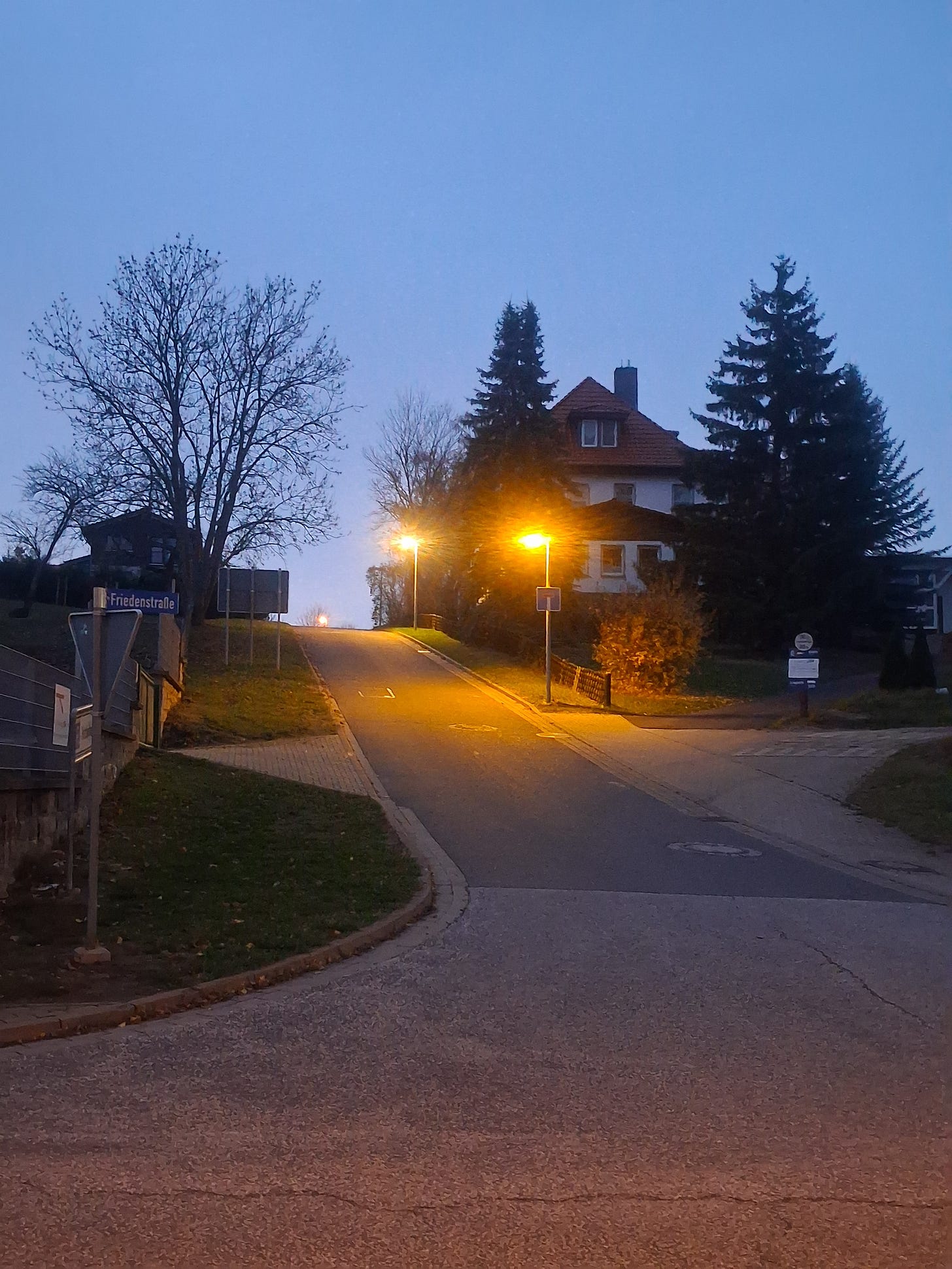My annual reading list. It’s pretty much my sole annual tradition, other than a few vague concepts – I do, for instance, like to watch Mr. Show’s “Monster Parties: Fact or Fiction?” at Halloween, but that’s hardly a necessity.
I’m not a literary critic. I’m not out here trying to say what I think the best books of 2025 were, and frankly I’m suspicious of anyone who can do so. Given the number of books released in each year, how can anyone take a serious glance at the literary scene as it stands in 2025, read the new releases closely enough to really understand them, and confidently come up with a list of favorites? Even if you deny yourself the pleasure of reading older books – a pleasure I can’t live without – you’re still not going to be able to read more than, say, 150 or so new volumes maximum and give them serious consideration. It’s not like movies (two hours at a time) or music (less than an hour while you’re doing something else). Books command attention and care and time. And for that reason I am happy to ignore literally all critics’ year-end lists. Fuck you guys.
No, my favorite-book lists almost entirely consist of older work. These are just the books I read this year that I loved, for various reasons. If I pushed myself, I might be able to make year-end favorite lists for music and movies, but I just lack the passion there (although Ethel Cain’s Willoughby Tucker, I’ll Always Love You got me through a lot of dark moments in a year full of them, and frankly she’s a good enough songwriter she belongs on the list below). Books are different. I can listen to a crappy song or watch a crappy movie and it’s a non-issue. But a shitty book will put me in a genuinely bad mood. I don’t care to see barbarians storming my cathedral.
So here you go, you bastards, divided into three sections, with my own commentary as to why you should read each of these.
Fiction and poetry and pretty things
Charles Baudelaire – Paris Spleen
Been reading excerpts of this for years, Paris as capital of modernity. Vintage Baudelaire.
Agustina Bazterrica – Tender Is the Flesh
Cannibalism is as overdone now as zombies were in 2010. Bazterrica proves that it doesn’t need to be deployed as lamely as it is in most contexts.
Mircea Cartarescu – Solenoid
Hey, it’s a 700-page Romanian novel with extended discussion of the Voynich Manuscript. Cut me a fat rail of this shit.
Jordan Castro – The Novelist
It’s very strange to me that Kurt Vile got as close as he ever got to a hit with “Pretty Pimpin” given that the lyrics are pretty much a man going “duuuuuude.” This is a lot of duuuuuude. But very good all the same.
Pierre Drieu La Rochelle – The Fire Within
Junkie books are normally boring, especially when they’re about hot junkies having hot sex with jutting ribcages and track marks. But somehow Drieu La Rochelle makes it work.
Nawal El Saadawi – Woman at Point Zero
A straightforward novel about what it is to be a woman with a mind of her own in a society that does everything it can to punish that. A social realist novel in the old mode, something that’s not really done anymore.
John Fante – 1933 Was a Bad Year
A story of born-loser working class life among Italian immigrants in the Great Depression. Straightforward and heartfelt and pure feels.
Damon Galgut – The Promise
I was a bit miffed by some of the telegraphed punches here, but I think Galgut gets a place on this list all the same because of the ways in which this is an almost perfect encapsulation of life under an apartheid society, because even after apartheid ends, it’s not like everything turns out OK.
Jacqueline Harpman – I Who Have Never Known Men
Sounds like a shitty A24 movie, plays out like a top-tier A24 movie. Women in a prison deep underground, explanation minimal, vibes oppressive as hell.
Wolfgang Hilbig – The Females
More explicitly violent and fucked up than a lot of Hilbig’s other work, which tends to allude to recent horror more, for which…
– The Sleep of the Righteous
Absolute top-tier eerie Central European bleakness. Not long after I read this, I came upon an unearthly DDR television mast emerging from the icy fogs over Saxony-Anhalt. Apropos.
Gert Jonke – Geometric Regional Novel
Another member of the Vienna avant-garde as represented by Jelinek, Bernhard, etc., taking on the subject of a completely mathematically ordered town. Does anyone even write like this anymore?
Alfred Kubin – The Other Side
Eldritch horrors, the German version, as narrated by a dorky German narrator who seems more concerned with minutiae than with the unbelievable weirdness of everything around him.
Benjamin Labatut – The Maniac
Essential reading for the AI age. I’ll leave it there.
Mary McCarthy – The Group
No one reads Mary McCarthy anymore, which is a shame. She has a remarkable talent for channeling the voices of the most annoying people you meet, and actually making you feel bad for them.
Reza Negarestani – Cyclonopedia
Imagine if Deleuzean ideas weren’t used for fake philosophy, but as a tool for literary exploration, with Islamist terrorism and oil extraction regimes functioning as a rhizomatic object. That’d be cool, and Negarestani agrees.
Paul Nizan – Aden, Arabie
I will never get over my fetish for travel in a more romantic era.
Wilfrido Nolledo – But for the Lovers
Totally forgotten Filipino writer, and his only novel. Manila is a Latin American city adrift in Asia, and this is some Garcia Marquez level insanity.
Fernando del Paso – Palinuro de Mexico
If you were to do bibliomancy on a Spanish medical textbook.
Joseph Roth – The Radetzky March
A semi-forgotten novel of familial decadence and decline in the late 19th Century, standing firmly alongside Buddenbrooks and the rest. A chronicle of all that rot and chaos that came to a head with a gunshot at a parade in Sarajevo in 1914.
Masahiko Shimada – Death by Choice
What would you do for the remaining few days if you planned to kill yourself? Shimada has a few ideas, and it goes much different than I had anticipated. Some real curveballs here, and they don’t seem like a deliberate attempt to subvert expectations so much as avenues I simply hadn’t thought of.
Adalbert Stifter – Motley Stones
I’d read Rock Crystal before, but all of these geologically themed novellas are remarkably evocative of Alpine life in the olden days. Strange and haunting.
William Styron – The Confessions of Nat Turner
Problematic favesies.
John Waters – Carsick
It took me until he was hitchhiking with Patty Hearst to make me realize he was pulling my leg.
Read this to understand the world, because you’re an academized sicko
Zygmunt Bauman – Liquid Modernity
Of all the metaphors for modernity after modernity, this might be one of the creepiest and most effective.
Robert Caro – The Passage of Power
The story of how LBJ became LBJ – let’s pray Caro lives long enough to finish volume 5 of this absolute magnum opus, the greatest of all biographies.
Annie Ernaux – A Woman’s Story
How well do you know your parents?
Byung-Chul Han – The Burnout Society
OK, this is absolutely THEEEEEORY, and I’m not sure how necessary it is as a text, but it’s fucking resonant. When we are told we can do anything, we realize we necessarily have to do less than everything, and we feel like nothing.
Ivan Illich – Tools for Conviviality
A book that explains why your iPhone makes you feel worse about yourself.
Karl Marx – The 18th Brumaire of Napoleon Bonaparte
The worst people are back, time to read about Napoleon III building big beautiful walls all over Paris.
Hans-Georg Moeller – You and Your Profile
A remarkably incisive, compulsively readable story about the nature of authenticity, the nature of the social media profile, and the epistemological consequences.
Pasuk Phongpaichit & Chris Baker – Thaksin: The Business of Politics in Thailand
Sometimes people ask me to explain Thai politics, and then I have to patiently inform them that I’d have to explain a lot about the incongruity of the left-right spectrum before I even get into the policy-based meat and bones you want me to talk about. Pasuk and Baker do a better job than I ever could.
Corey Robin – The Enigma of Clarence Thomas
Clarence Thomas, former black nationalist, current active participant in the destruction of civil rights. A kind of difficult to verify but fascinating idea of how these two things aren’t as incommensurate as you might think.
Quinn Slobodian – Crack-Up Capitalism
Hey, Anglo-American liberals want to privatize your cities and turn you all into serfs, just like the conservatives.
Richard Wolin – The Seduction of Unreason
What happens when you abandon universal concerns? Radical pluralism means that brute force, whether physically brute or capitalistically brute, charges in.
Shoshana Zuboff – The Age of Surveillance Capitalism
The most depressing, most prescient book I’ve read all year.
Nonfiction, but read more for the style and the feels and the memoiristic reverie than to get capital-I Information
Shalom Auslander – Feh
A long and bitter kvetching by a highly uneven writer, but performing at top level here. There's also a story about an Indian bachelorette party and Shalom Auslander that was far too cringe for me to insert here.
Bill Buford – Among the Thugs
You think you’re a journalist, but you didn’t get beat up by Italian carabinieri as part of your in-depth reporting on lower middle-class criminal Brits, I’m guessing.
Owen Hatherley – Clean Living Under Difficult Circumstances
We’re doing a drunken Irish wake for modernism over here.
Alfred Kazin – Starting Out in the Thirties
Mostly forgotten writer, totally forgotten book. But my god it’s a beautiful intellectual odyssey of New York back when Trotskyists and Stalinists debated in the CCNY lunchrooms.
Jarett Kobek – Do Every Thing Wrong!
It’s a book about XXXTentacion. And it’s amazing.
Michel Leiris – Manhood
Love letter to your dysfunctional penis.
Pankaj Mishra – The World After Gaza
OK, it seems a bit too easy to write a Gaza book right now, but this is worth it. It’s a story about how the concept of Israel was corrupted over time, from an outsider’s perspective, and how, almost certainly, this genocide is just gonna keep going.
Jonas Mekas – I Had Nowhere to Go
A couple years ago, I met Mekas’ son at a garden party in Brooklyn, and he was quiet, intense, curious, and humble. All things I see in his father’s memoir.
Douglas Murphy – The Architecture of Failure
A really gorgeous series of architectural essays. I don’t mean to talk ill about Frank Gehry so shortly after he died, but Murphy sums up all the bad vibes I’ve always gotten off the guy’s work.
Harvey Pekar – Not the Israel My Parents Promised Me
Not sure if this counts as nonfiction – it is a comic book after all. But Pekar is as always a brilliant storyteller, and this is a great story about one Jewish man’s sundering with the Israel that his Holocaust survivor parents dreamed of.
Adolph Reed – The South
A memoir that, for my money, conveyed the experience of living black in the Jim Crow South more powerfully than anything I’d read before.
***
Dear god, I did a listicle. Fuck the (twenty) five-o.







